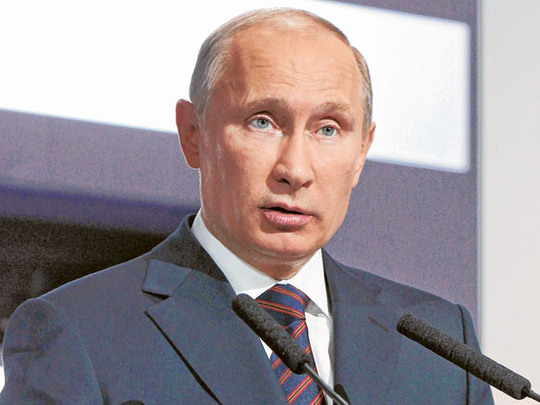
If Russia's Prime Minister Vladimir Putin plays his cards right, by the time he has finished ruling Russia, he will have spent more time in power than Leonid Brezhnev, the great bear of the Soviet era. Poised to return as president next March, after a four-year stint as prime minister, Putin would be 71 in 2024 at the conclusion of two six-year terms in the Kremlin.
Whether he lasts that long we shall see, but thanks to a recent encounter with a plastic surgeon's scalpel, we can at least be sure that he will never look as old as his predecessor in the Kremlin. And as he has laid bare his intentions to retake the centre stage, Putin has been rolling back the years in other ways. This week he has unveiled a grand vision to create a Eurasian Union linking old Soviet neighbours, foreseeing a ‘powerful, supranational union, capable of becoming one of the poles of the modern world'.
The Eurasian Union could provide an "economically sound and balanced partnership" with the European Union. So what does Putin want? His idea of a fully functioning revisionist fraternity seems a non-starter. Its success is likely to be as cosmetic as his recent operation. A customs union agreed with Belarus and Kazakhstan in 2009 is still very much a work in progress. Kazakh officials privately admit that they are not doing well out of the deal. It is hard to see who, from the 15 republics that were in the USSR, would welcome Moscow's entreaties. The three Baltic states — Latvia, Estonia and Lithuania — are happily independent and tired of Russia's sneering and cyber-bullying.
Ukraine, which would be crucial to any new alignment, wants to join Europe and has not appreciated Russia's threats to its gas supply. Uzbekistan, Tajikistan and Turkmenistan have shown a desire to balance their foreign policy interests between Moscow, China and Washington.
"It is utterly pie in the sky," says James Nixey, Russia analyst at the Chatham House think tank. "This is Putin living in the past, trying to recreate the supposed glories of his first stint as president. The fact is Russia has no mates, and if you don't have any real friends this won't work. The EU may have its problems with the Eurozone, but it is still more attractive than something that harks to the past."
Reasserting control
During Putin's first two terms as president, from 2000 to 2008, Russia recovered from the ignominy of seeing its economy fall apart under Boris Yeltsin. Revolts in the Caucasus were contained and a level of stability was achieved that will be his selling point in the so-called election that will take place in March. As he prepares to take over from President Dmitry Medvedev, his hand-picked seat-warmer for the past four years, Putin needs to demonstrate that he can live up to the action-man image he has cultivated - hunting bears, flying planes and getting his pecs out for the media at every opportunity.
Exerting control over neighbours is an obvious step towards reasserting Russia's role on the world stage. "Expect more bellicose rhetoric, more nationalism and other worrying signs," says Nixey. "Like anyone of his generation or older, Putin is a child of the Soviet Union. Russia doesn't wield the influence it did then but it is almost inevitable that anyone in power holds ambitions swayed by that era." Medvedev, who is 15 years younger than his master, has tried to modernise and liberalise the economy. He adopted a softer tone with the West and cooperated with President Barack Obama's ‘reset' policy that followed the 2008 invasion of Georgia.
Putin may have been pulling all the strings, but Medvedev showed signs of understanding that Russia was at a crossroads, facing a choice between becoming a semi-Westernised, half-decent democracy with a semblance of the rule of law, or continuing towards a thugocracy where corruption is rampant, exiled critics are fatally poisoned in London hotels, political opponents are either jailed or shunned by the state media, while political clones and clowns are created to present a veneer of democratic choice.
There is much more nostalgia for the safety nets of the Soviet era than many in the West might expect. Putin's popularity rating is about 50 per cent, not least because Russians are proud of their country's size and culture, and appreciate his projection of strength. They also share his ambivalence towards the West. Many Russians loathe the system — and Putin — but shrug and observe the fatalism that accepts that strongmen and corruption will preside over their lives.
— The Telegraph Group Ltd, London 2011










